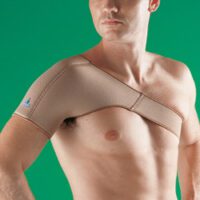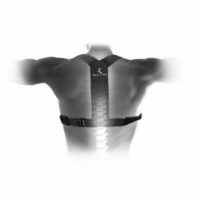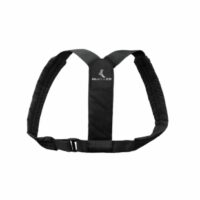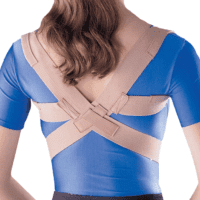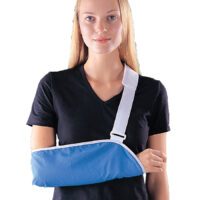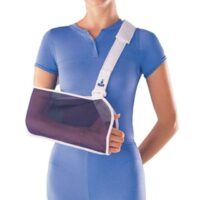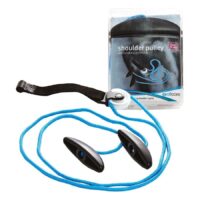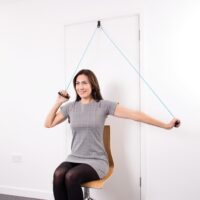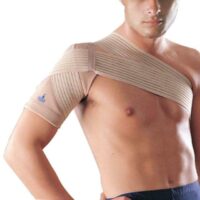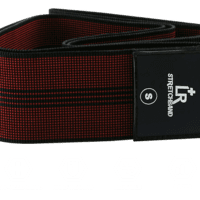Biceps Tendinopathy
Article by John Miller

Biceps Tendinopathy
What is a Biceps Tendinopathy?
Biceps tendinopathy encompasses various biceps injuries, such as:
- Biceps tendonitis (inflamed tendon)
- Biceps tendinosis (non-inflamed degenerative tendon)
- Biceps tenosynovitis (inflamed tendon sheath)
- Ruptured biceps tendon (due to degeneration or tear)
While many traditionally referred to these injuries as biceps tendonitis, today’s physiotherapists and doctors more commonly use the term biceps tendinopathy.
Locating the Biceps Tendon
Knowing the anatomy of the biceps muscle helps in understanding biceps tendinopathy. The biceps brachii consists of two parts: the short and long heads. The long head often shows symptoms. This long head runs over the humerus head (the ball joint) and connects at the top of the shoulder socket. It plays a crucial role in stabilising the shoulder joint. The biceps tendon passes through the bicipital groove at the shoulder’s front, where inflammation, primarily due to friction, frequently happens. If inflammation arises, it results in biceps tendonitis or tendinopathy.
Causes of Biceps Tendinopathy
Biceps tendinopathy rarely occurs on its own. It’s prevalent in sports like swimming, gymnastics, and certain contact sports. Factors such as overuse, tendon impingement, shoulder joint instability, or trauma can lead to its development. It often pairs with other shoulder issues, such as rotator cuff tears and shoulder instability. People in jobs demanding overhead shoulder tasks or heavy lifting face higher risks.
Identifying Biceps Tendinopathy Symptoms

Those suffering from bicep tendonitis and tendinopathy often experience:
- Anterior shoulder pain, sometimes extending to the elbow.
- Pain during overhead activities, particularly when combining abduction and external rotation.
- Increased pain with shoulder flexion, forearm supination, or elbow flexion.
- Some report muscle weakness or a snapping sensation during shoulder movements.
- Rest and ice typically relieve the symptoms.
Diagnosing Biceps Tendinopathy
Based on your symptoms and history, a physiotherapist or doctor might identify biceps tendinopathy. Ultrasonography and MRI are the top diagnostic tools. For detailed diagnostic guidance on your shoulder issue, consult a reputable shoulder healthcare expert.
Treatment Options for Bicep Tendinopathy
The type of tendinopathy dictates the treatment approach. It’s essential to pinpoint and address the cause of your tendinopathy.
For inflammatory conditions like tendonitis, non-steroidal anti-inflammatory medications or cortisone injections might help, along with ice application. On the other hand, tendinosis, being non-inflammatory, might not benefit from these treatments. Instead, specific tendon strengthening exercises, as advised by a physiotherapist, prove effective.
For a ruptured biceps tendon, especially recent ones, you might need a referral to an Orthopaedic Surgeon. However, in middle and older age these tendon are rarely repaired.
Managing Pain
In the initial stages, lifting your arm or sleeping might be uncomfortable. The primary goal is active rest, meaning refraining from activities that trigger pain. Your physiotherapist can guide you on the best resting positions or provide special taping for pain relief. Using ice can also help reduce pain and swelling.
Educating Patients and Correcting Techniques
Understanding the cause of your biceps tendinopathy is vital. Your physiotherapist can shed light on activities and postures that might worsen your condition and might suggest adjustments to your technique or workload.
Enhancing Joint Stability and Strength
Addressing joint stability and function is essential. Your physiotherapist can guide you through exercises that improve stability and strength, particularly if joint instability is the primary cause.
Considering Neck and Upper Back Posture
Your neck and upper back play a role in shoulder posture and control. Sometimes, stiffness or pain from inflamed neck joints can impact shoulder function. Your physiotherapist can advise on treating neck and upper back issues.
Restoring Normal Function
Your rehabilitation will depend on your shoulder’s specific needs. If your injury comes from a sport, high-speed activities or repetitive motions might be the culprits. Your physiotherapist can guide you through exercises to prevent re-injury and enhance performance.
Biceps Tendinopathy Prognosis
Most bicipital tendinopathies respond well to rehabilitation. Though ruptured tendons might not always need surgery, they typically respond favourably to a well-guided physiotherapy program. The recovery time can vary, depending on the associated conditions.
Returning to Sport or Work
A tailored exercise regimen, considering your sport or job, is crucial for a safe return. Your physiotherapist can work with you, setting goals and schedules, ensuring a smooth transition back to your activities.
In Conclusion
Progressing through rehabilitation varies from person to person. Your physiotherapist will monitor each stage, ensuring a seamless shift between phases based on your assessment and improvement. Remember, thorough rehabilitation minimises the risk of future injuries. Stay patient, dedicated, and in close contact with your healthcare professional.
Stay safe and keep your shoulders healthy! If in doubt, please seek professional advice.
Related Articles
- Rotator Cuff Tendinopathy: Discusses various conditions related to the shoulder’s rotator cuff tendons.
- Shoulder Pain: Offers comprehensive insights into different shoulder conditions, including shoulder impingement and bursitis, which can be linked with biceps tendinopathy.
- Rotator Cuff Tear: Covers conditions like bicep tendinopathy and rotator cuff tears, providing a broader understanding of related shoulder issues.
- Effective Shoulder Impingement Treatment and Advice: Details the causes and treatment options for shoulder impingement, a condition that can accompany biceps tendinopathy.
- Rotator Cuff Exercises: Highlights exercises and therapies for shoulder rehabilitation, which can be beneficial for those with biceps tendinopathy.
- Rotator Cuff Injury: Discusses various shoulder-related injuries and conditions, including muscle strains and tendon conditions like tears and tendinopathy, which could be relevant for those suffering from biceps tendinopathy.
- What is Your Rotator Cuff?: An article that describe your rotator cuff and what it does.







